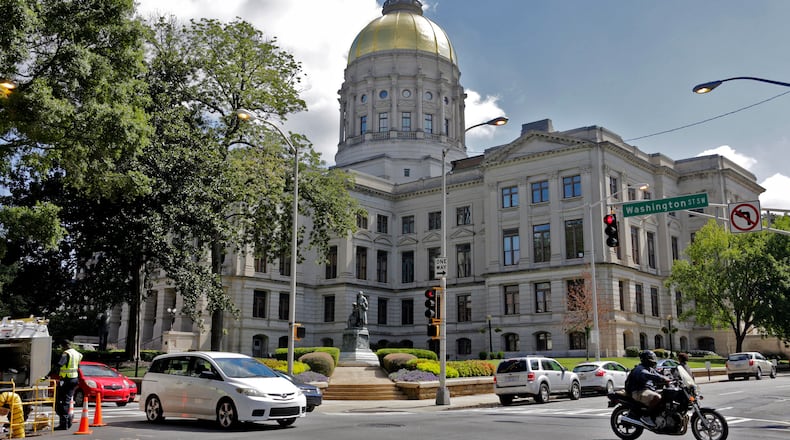Georgia’s economy is in good shape – maybe.
Gov. Nathan Deal and the state's chief economist both made a case that the arrow is pointing up during hearings this past week on the governor's proposed budget of $25 billion for fiscal 2018.
“The key components of our economy are growing really well,” said Ken Heaghney the economist. He pointed to job creation — 99,000 new jobs from November 2015 to November 2016 — and rising tax collections.
Areas seeing the strongest job growth, Heaghney said, are Athens, Savannah and Atlanta.
But there’s always a skeptic. If you’re trying to sell a budget, it doesn’t help if that skeptic is the chairman of the Senate Appropriations Committee.
"It may look better than it really is," said Jack Hill, a Republican from Reidsville, not Athens, Savannah or Atlanta.
The chairman could just be channeling the results of an Atlanta Journal-Constitution poll conducted earlier this month that showed that while 60 percent of Georgians believe the state's economy is in good shape, such beliefs wane once you get outside metro Atlanta. In southeast Georgia, Hill's home region, about 39 percent appeared to be happy with the strength of the state's economy.
But Hill, who's known for keeping a sharp eye on economic indicators, offered some more concrete examples for pessimism. He pointed out that the fuel tax increases brought to you by lawmakers in 2015 helped prop up what otherwise would have been considered slow revenue growth in the first half of the fiscal year.
The senator raised concerns about individual income tax collections in his most recent weekly newsletter, calling the rate of growth "alarming." He wrote that those collections are up only 2.6 percent from fiscal 2016, which is much slower than what the state has experienced in recent years.
For his part, Deal has offered as evidence of a successful economy the state's ability to sock away $2 billion in its savings account, aka a rainy day fund.
So is it going to rain? You may want to keep that slicker handy, just in case.
There’s stream flows and cash flow
Georgia and Florida remain in battle over how much water from the Chattahoochee and Flint rivers flows into the Apalachicola River.
Florida sees it as a dribble. Georgia, somewhat more than that.
But there’s also a river of cash at stake, as Georgia just made a new injection into the emergency fund it set up for the court fight.
This is no case of trickle-down economics: Gov. Nathan Deal just shifted $3.5 million into the pot to pay legal fees. That follows the $26 million he set aside last year for the case.
The two states squared off in a Maine courtroom late last year, and they are now waiting for Ralph Lancaster, who was tapped by the U.S. Supreme Court to oversee the case as a special master, to issue an order. But he recently ordered Georgia and Florida to return to the negotiating table.
Meanwhile, Alabama watches. Like Florida, Alabama claims that Georgia draws too much water from the Chattahoochee and Flint to the detriment of its residents and the ecological system.
Florida also faults Georgia for the collapse of the oyster industry in Apalachicola Bay. Georgia blames that disaster on Florida for its own reckless behavior.
Whatever Lancaster eventually decides, it’s not likely to end the water war. His ruling can be appealed to the Supreme Court, and the states over the decades have always found a new way to fight over stream flows and up the cash flow.
Conservatives turn attention to death penalty
The death penalty, itself, appears to be headed down the green mile, and some Georgia conservatives – while not calling for its halt, at least for now – are willing to look at helping it on its way.
State Rep. Brett Harrell, R-Snellville, has doubts about the government's ability to perform many tasks and says a "healthy skepticism of our state's death penalty is warranted."
“Many individuals have been wrongly convicted and sentenced to die,” Harrell said in a statement leading up to a meeting last week of a group called Georgia Conservatives Concerned About the Death Penalty. “Meanwhile, taxpayers are forced to pay for this risky government program, even though it costs far more than life without parole.”
This comes after Georgia led the nation in executions in 2016 with nine, but also at a time when prosecutors both inside and outside the state are pursuing the death penalty in fewer and fewer cases. Only four other states even carried out the death penalty last year: Texas, with seven; Alabama, two; and Florida and Missouri, one each.
In Georgia, prosecutors have filed notices seeking the death penalty 21 times over the past two years. That compares with 40 such notices in 2005 and 26 in 2011.
Life without parole appears to be the favored option.
Jon Crane, a spokesman for Georgia Conservatives Concerned About the Death Penalty, said the purpose of its meeting was “educating people about the problems with the death penalty and to have a candid discussion from a conservative perspective.”
But he also stressed that there is no call for repeal.
Legislative session coverage
To see more of The Atlanta Journal-Constitution's coverage from the Georgia General Assembly's legislative session, go to http://www.myajc.com/georgia-legislature/. To track particular bills and resolutions, check out the Georgia Legislative Navigator at http://legislativenavigator.myajc.com/. You can also follow the proceedings on Twitter at http://twitter.com/GAPoliticsNews or on Facebook at http://facebook.com/gapoliticsnewsnow.
About the Author
Keep Reading
The Latest
Featured




